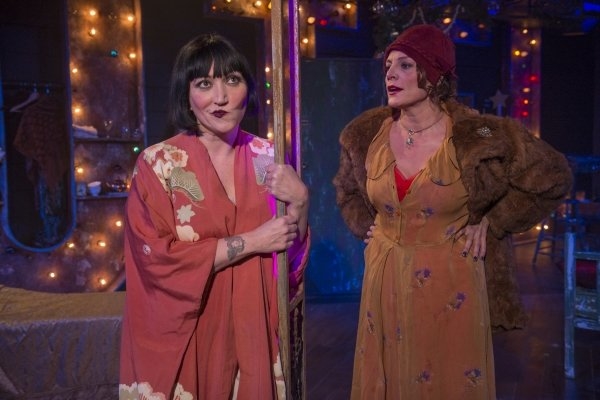The Mutilated

(© Michael Brosilow)
The Mutilated is decidedly not one of Tennessee Williams' better works. That's not just my opinion: The one-act opened on Broadway Feb. 22, 1966, as half of Slapstick Tragedy, a double bill of that also included Williams' The Gnadiges Fraulein. The production closed after seven performances. The Mutilated has rarely been produced since, so it's all the more curious that Chicago's acclaimed A Red Orchid Theatre decided to launch the new year with it.
Set primarily in a seedy hotel in Williams' beloved New Orleans, The Mutilated is filled with themes that the playwright mined to such exquisite effect in The Glass Menagerie and A Streetcar Named Desire. Loneliness and broken souls are front and center. So is alcoholism, seedy surroundings, and desperate, empty sex.
Directed by the single-named Dado for A Red Orchid, the flaws in Williams' work are readily apparent. The dialogue moves uneasily between comedy and tragedy, corny jokiness abutting awkwardly against soapy pathos. The plot is as thin as a cheap negligee that's been through the washer a few hundred times. The odd musical interludes feel like fever dreams wandering in from another show entirely. Yet even taking all that into account, there are two inarguable reasons to hightail it to the box office.
The Mutilated features two of Chicago's strongest leading ladies: Jennifer Engstrom and Mierka Girten. Individually, they are at the zenith of their formidable powers, and together they are awesome, in the true sense of the word. They elevate a mediocre play to must-see status.
Williams' flimsy plot unfolds on Christmas Eve in the late 1940s. Celeste Delacroix Griffin (Engstrom) has just been sprung from the pokey where she was being held on a shoplifting charge. Her brother Henry (Doug Vickers) has bailed her out, leaving her with a job lead and instructions never to contact him again. On the sidewalk in front of the decrepit hotel where she once lived, Celeste flashes her bosoms at passers-by in hopes of getting a drink or a dollar for her trouble. Despite the insistence of hotel clerk (Lance Baker) that there's no room in the inn, Celeste inveigles her way past the front desk and up to the door of her former best friend, Trinket Dugan (Girten).
Trinket is an oil heiress slumming it at the no-tell hotel, swilling wine from a gallon jug and radiating shame over the "mutilation" left on her body by a bout with breast cancer. The story hinges on whether Celeste will succeed in getting back in Trinket's good graces. As Williams makes clear, it's mighty tough to "bury the tomahawk" when it remains stuck in the skull of the person you're attempting to make nice with.
As Celeste, Engstrom is a gale-force hurricane of boozy, floozy magnificence. Flaunting her assets, wheedling her way into Trinket's room, or guzzling down Christmas cheer, she's a force of nature, a low-rent fury engulfing all she encounters in a vortex of loquacious, tawdry splendor. Trinket is similarly lost, despite the limitless resources of her father's gushers. She could afford to stay anywhere, but she's chosen a grimy dive because it fits perfectly with the way she sees herself. Girten gives Trinket the refined tones of a lady raised with elocution lessons, yet instills the words with an alternately heartbreaking and comical desperation. After a few absinthe cocktails, Trinket picks up a sailor (Steve Haggard) in a scene that's memorably garish and clownish, with the clowns teetering over a truly frightening abyss.
Dado has assembled a ridiculously talented supporting cast that provides a vivid backdrop to Girten and Engstrom's escapades. As the Bird Girl, Natalie West brings a hilarious, cold-eyed matter-of-factness to a feather-covered, freak-show escapee whose spastic dance calls to mind old-school circus geeks. As the hotel clerk, Lance Baker has the weary, stone-cold stare of somebody who just can't muster the energy to be shocked anymore. And musicians Roy Gonzalez (guitar), Mario Hernandez (bass), and Lauren Vogel (violin, banjo) create the backbone for a the hallucinatory band that performs cracked-out Christmas carols and mournful dirges throughout the play.
Grant Sabin's set design is a character unto itself. Rusting wrought-iron filigree evokes the fading glamour of a down-on-its-luck pocket of New Orleans, battered hotel doors speak to a rooming house of violence and isolation. The weathered wood of the bar Trinket and Celeste frequent has the dull finish that evokes last call at the last-chance saloon. Mike Durst and Clarie Chrzan's lighting design is equally atmospheric, a mix of Christmastime twinkles and disturbing shadows.
The music that peppers the production gives it a dreamy feel, as if we're viewing the action through that weird veil of semiconsciousness that provides the micro-thin barrier that differentiates the first moment of sleep and the final millisecond of wakefulness.
Yes, there are problems. The plot is negligible. The music, while bizarrely beautiful, is jarring. There's no characters with any depth to speak of, except for Trinket and Celeste. But with Engstrom and Girten at the broken heart of it all, The MutilatedÍ is worth seeing.











